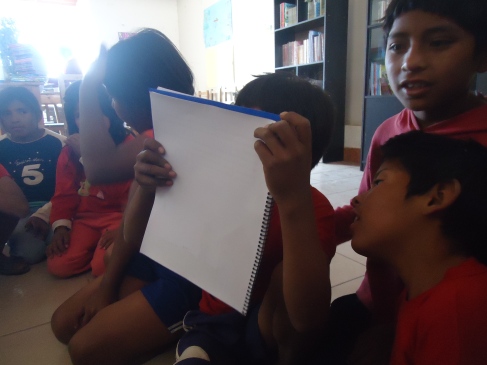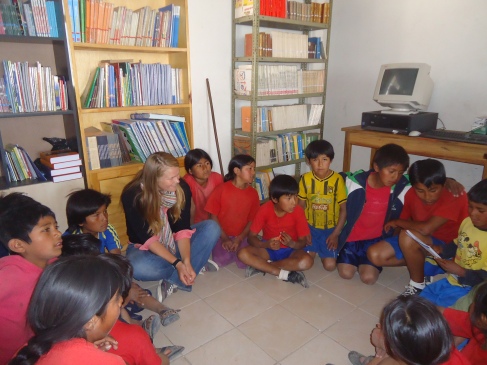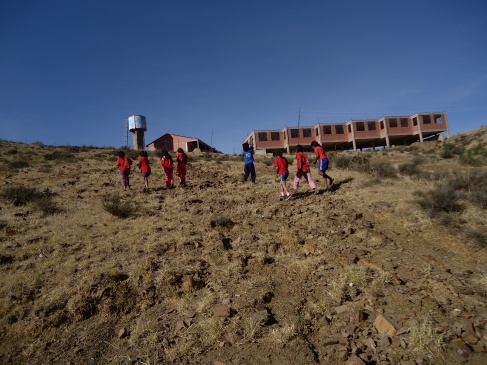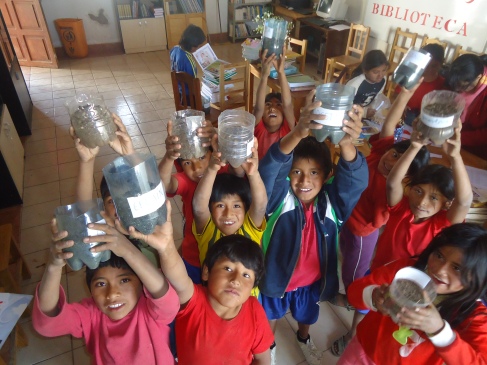Juan y los frijoles mágicos
- Posted In : Pampa Aceituno , Stories , Gardening, Pampa Aceituno
- 0 : comment
Hello! I’m Emma and I am currently a senior at Bowdoin College in Brunswick, Maine, USA. I have spent the last two months working for BiblioWorks. My job has been twofold: I’ve been grant writing and working in BiblioWorks’ newest library, Pampa Aceituno. Pampa Aceituno is a small school, set high in the hills about 25 minutes outside of Sucre. Sadly I left BiblioWorks, Pampa Aceituno, and Sucre yesterday, so my blog posts will be published from afar but nevertheless– this is what I accomplished in beautiful Bolivia.
Last week I completed a project I had started a few weeks earlier. I printed off Jack and the Magic Beanstalk (in Spanish) and every student received a page to illustrate. The students edition of Juan y los frijoles mágicos looks great– I had it bound and covered so it is in an actual book form and now a proud piece of the Pampa Aceituno library. On Tuesday, I was able to borrow the third and fourth graders for an hour to read their edition of Juan y los frijoles magicos and plant some of their own magic beans for a fun interactive project. The first job was filling the containers (recycled water bottles) with soil. The kids all ran down the hill in search for some decent dirt, which believe it or not is easier said than done. The whole region of Chuquisaca, especially Pampa Aceituno, is very dry and arid, so our containers have lots of twigs and other debris in them, but it is still dirt, regardless of the dirt the beans are magic so they’ll grow in anything… right?
When the students returned to the library with dirty hands and dirt streaked faces, I sat them in a circle so we could read the story together aloud. Sitting cross legged in an open space is common in classrooms back home, but the students were confused when I  instructed them to make a circle– I honestly think it was the first time they had been organized in this communal and open way– maybe sharing or working together isn’t a common teaching method in Bolivia. The students passed around the book, each one reading aloud the page they illustrated. Some students read clearly, confidently, and were spot on with pronunciation, while others stumbled over many words. They all could read, which is an accomplishment in itself, but they have a long way to go until they become proficient and self-assured readers– but luckily for them the library is the perfect place to gain these skills.
instructed them to make a circle– I honestly think it was the first time they had been organized in this communal and open way– maybe sharing or working together isn’t a common teaching method in Bolivia. The students passed around the book, each one reading aloud the page they illustrated. Some students read clearly, confidently, and were spot on with pronunciation, while others stumbled over many words. They all could read, which is an accomplishment in itself, but they have a long way to go until they become proficient and self-assured readers– but luckily for them the library is the perfect place to gain these skills.
After the story, each student planted their own magic beans. This is my introductory piece into gardening, the plan from the get-go has been to have the younger students work with container gardening and the older students in a real garden (which great news: is finally underway!!). The containers are sitting in the library and classroom now, and students have been instructed to water them everyday. Lets hope these beans actually sprout. Wouldn’t that be terrible, if my magic beans didn’t grow. Yikes– everyone send positive vibes towards the seeds in Pampa Aceituno.
The reason why it took so long to complete this project is because there were strikes and myriad holidays. Another challenge with my work in Pampa Aceituno is working around the teacher’s schedule; in order to get kids into the library we have to take them from their classroom. It is a tricky situation but hopefully in future months, years or some indefinite amount of time, library will be an actual class where the students would learn research techniques, work on research projects, produce book reports, and simply learn to love to read. Having library as a class would be the ideal situation as it would make it so much easier for BiblioWorks to accomplish what they set out to do– improve literacy rates so children can take advantage of more life opportunities.



